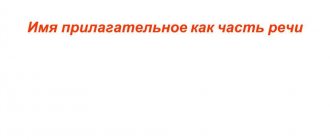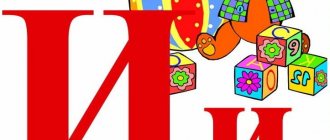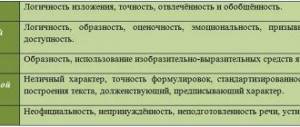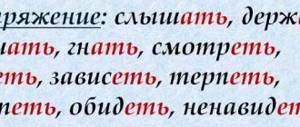Russian language lesson notes for 6th grade. Noun
Lesson summary in the Russian language for grade 6 on the topic Noun (generalization)
The lesson is presented in a traditional form with different types of work and is devoted to consolidating the studied material on the topic “Noun”
1. Org. moment 2. Messages of the topic and purpose of the lesson. The topic of our lesson: Generalization of material on the topic: Noun. The purpose of the lesson: to repeat the studied theoretical material and perform a series of exercises based on it. 3. Repetition of the studied material. Let us now repeat the general meaning, morphological features and syntactic role of the noun. Now I will show you cards with general meanings of different parts of speech, and you need to choose only the card that contains the meaning of the noun. - So, an object, a sign of an object, an action, a number of objects, a sign of a sign (visibility). — Why couldn’t you choose cards with other meanings? (Because a noun denotes an object). - By what questions do we recognize a noun? (Who what?). (Visibility). - Read the morphological features of parts of speech: animate/inanimate, proper/narrative, gender, declension, number, case, tense, person (visuality). - Which ones do not belong to the noun? (tense, person) Each part of speech requires a certain order. - What groups can these signs be divided into? (constant/inconstant) (Visuality) Guys, let's divide these signs into two columns, (constant: proper/narrative, animate/inanimate, gender, declension. Inconstant: number, case). — What syntactic role does the noun play: subject, predicate, object, definition, circumstance (visuality). — Recalling the learned theoretical material, we reconstructed the scheme for the morphological analysis of a noun. 4. Performing training exercises. — Do you think it is difficult to find a noun among other words? (No). — How will you look for a noun among other words? (ask a question and see what the word object means) - Now let’s do an exercise where you must show the ability to find a noun. But the task becomes more difficult for you. - Look at the printouts. Read the words. Burn, bitter, bitter, burner, burning, grief, mustard, bitter, grieve, bitterness, hot, burnt, mustard, miserable.
- What is the outwardly identical root for these words?
(gor) - Can all words be considered related? (no, because the lexical meaning of these roots is different) - Look at these words and tell me how many groups of related words are represented here? (three groups: 1. - words with the meaning: burn; 2. - grief; 3. - bitter). - Divide the page into three columns, draw the lines so that they are not visible - distributive dictation. - Find related words for each group and write them down in columns. Burn Bitter Grief Burner Mustard Goryushko Burning Bitter Grieve Hot Bitterness Miserable Burnt Mustard
- Read what you got.
- Underline the nouns among them. — In this exercise we combined two skills: we proved that we know that a noun denotes an object and answers the questions: Who? What? Strengthened the skills of identifying related words. — We said that the table on the board is a diagram of the morphological analysis of a noun. Using specific examples from the text, we will conduct a morphological analysis. To do this, we will write down a short text from dictation. Nikolai went skiing into the forest.
The pre-spring sky was blue. The snow sparkled dazzlingly, and the shaggy sun burned in the blue sky. The clearing, all bathed in sunshine, glowed with snowy blue. Each pine needle, clearly visible individually, lived and enjoyed the sun. Rejoicing in the sun, from time to time bullfinches and tits fluttered from branch to branch. - Find proper names in the text (Nikolai).
- Name several common nouns (bullfinches, sky, etc.) - In the third sentence, indicate the declension of the noun (snow - 2nd declension; blue - 1st declension; sun - 2nd declension) - Find nouns of the third declension in the text (separately - 3 declension) - What can be said about the declension of nouns “from time to time”? (variably indeclinable). - In the last one, sign the case of the nouns (to the sun - D.p., from the branch - R.p., to the branch - V.p., bullfinches and tits - I.p.). — Prove that the third sentence is complex (2 simple sentences in a complex sentence). - Let’s analyze the second part of the sentence according to its members (the shaggy sun burned in the blue sky). After the preparatory work, we will carry out a morphological analysis of the noun. 1 var.
(In) blue (in) blue - noun. I. Designation subject II. N.F. blue - what? 1. Post. morph, characteristics: vernacular, inanimate, female. , 1 cl. 2. Non-post. morph, characteristics: in units, pp. III. burned (where?) in the blue (obst.) 2 var. Sun Sun - noun. I. Designation subject II.N.F. sun - what? 1. Post. morph, characteristics: vernacular, inanimate, 2nd class, middle 2. Non-post. morph, characteristics: in units, etc. III. flooded (with what?) with the sun (additional) - Let’s consolidate the analysis of the morphemic analysis of nouns: blue, needle, blue (3 students sort it out on the board).
- Now with these exercises we have prepared the basis for repeating the spelling rules that govern the spelling of nouns. Now we will repeat the spelling of noun endings, O-E after sibilants in the root, ending and suffix, b after sibilants in comparison with other parts of speech, spelling of noun suffixes. — Why is morphemic analysis important for a spelling rule? (you need to be able to see in which morpheme the spelling is located). “To remember, let’s do this kind of work.” Word combinations are written on the board. Your task: verbally identify the spellings and explain the spelling: 1. In the pulp of a lemon, walked up the stairs 2. Hit the key, glass slipper 3. Many clouds, will help 4. Newspaper delivery man, an experienced welder 5. Key to the box, piece of cheese
- Let's stop Now there are only a few spellings to spell.
Let's review the spelling of noun endings first. Let's work with signal cards. Write down phrases only if an error is made (a graphic comment is made): Returned from a trip Sat in a gazebo Walked along the road Was at a lecture Report on botany Walked along a path Arrived at a station Not far from the village Report a danger Remind about a duty A story about fearlessness Studied mathematics Remembered America We met at the acacia tree Wrote it in a notebook Looked it up in a textbook Woke up in bed
- Let's repeat the spelling O-Y after the sibilants in the root, suffix and ending.
Prepare the table on page No. 42. — When do we write O at the root? (no emphasis) When E? (under stress if there is a transition to E) - What is said about the spelling of noun suffixes? (in suffixes under the accent O). — What is written in the endings of stressed nouns? (in accented endings it is written O). - Now we will perform the exercise “Third is a wheel”. I dictate three words at a time, you need to choose one extra one and write it down in your notebook: * Brush, storage, seam * Prey, locust, fontanel * Lump, flag, pod * Dacha, whisper, rustle
- Guys, let's check what you got .
— We will work with the rule of spelling nouns into sibilant in pairs of rotating members. Guys, put 10 numbers in a column. You receive a card with a number. Write down the words in your notebook under the same number as on the card. Then you exchange cards with your neighbor and complete his card, writing down the words under the same number as on the card. Having completed the neighbor's card, those who are sitting in the first option stand up and, together with the card that they have just completed, sit in the place of the neighbor at the back. The one who sits at the last desk moves to the first desk. When you come to a new neighbor, you immediately exchange cards and complete the neighbor’s card, writing down the words under the same number as on the card. 1. The night is dark;
the daughter is smart 2. The doctor is professional; black rook 3. Many clouds; change in your pocket 4. Several thousand; ambulance 5. black raincoat; gray mouse 6. cultured youth; horse harness 7. blue hoop; boundary; centuries 8. in the darkness of groves; bitterness of defeat 9. strongman in the ring; river snake 10. black mascara; sweet lie Check: - Exchange your work with your neighbor, pick up simple pencils.
I read the words and say the correct spelling, and you check and correct the mistakes. Give marks according to the standard written on the board. 0 errors - "5" 1-2 errors - "4" 3-4 errors - "3" everything else - "2" - Well done! And now there will be very interesting work. There is text on your tables. Read it. All the sentences in this text are confused, and you have a very difficult task: to restore the sequence of the text. 1. I began to silently pick berries (4) 2. I came across a large clearing, in the middle of which two oak trees grew (2) 3. Suddenly there was a rustling sound (5) 4. I walked along an endless highway, and then turned into the forest (1) 5 There were thickets of raspberries along the edge of the clearing (3)
- Let's check what you got (several students answer, then the correct option is said)
5. Summing up. - Which part of the speech was repeated? What rules for spelling nouns did you remember? 6.Homework Create a multiple-choice test at home for your neighbor, using the rules that were repeated in class.
We recommend watching:
Summary of a Russian language lesson in the 6th grade of a special (correctional) school of the VIII type. Summary of a Russian language lesson in the 6th grade of a correctional school of the VIII type on the topic “Case endings and Didactic game in the 6th grade in the Russian language. Summary of a lesson-game in the Russian language in the 6th grade. Spelling pronouns
Similar articles:
Lesson summary in Russian language 6th grade
Final test with answers in the Russian language for grades 5-6-7
Methodological development of a lesson in the Russian language. Creative essay: Sea voyage to the future
Lesson summary of educational selective presentation in 6th grade
Summary of a Russian language lesson in 6th grade on the topic: Neologisms
Noun exercise for training
We carry out further training work on phrases that include several nouns.
1. Take dictation.
From a trip to America and Japan; in a closet on the stairs; in the gazebo by the acacia tree; along the road and on the road; from blade of grass to blade of grass; at lectures on biology and botany; in a trench during an attack; around the tent and in the tent; along the path to the station; in a literature anthology; at the construction site of a narrow-gauge railway in Boyarka; in the annex near the greenhouse; along the path and on the path; from village to village.
Pay attention to an interesting game: brawl stars hack is installed on a phone running Android.
2. Make up phrases from these nouns: roadside, road - on the side of the road.
Edge, grove; building, factory; flash, lightning; library, academy; territory, clinic; history, Greece; border, Mongolia; outskirts, village; history, illness.
We move on to fixing the endings of nouns of the 2nd declension (in training exercises we include nouns of the 1st and 2nd declension).
1. Place nouns in brackets in the suggested case. Make sentences with three of them.
Was (distance), spoke (education), rest (Danube), reflected (harvest), met (publishing house), traveled
(car), arrows (dial), descended (parachute); filmed (film), walked (staircase), was treated (outpatient clinic), sees (distance), wounded (offensive), lived (basement), is located
(swimming), read (table of contents), written down (resolution), village (sanatorium), studied (lyceum), lecture (astronomy), told (impression), discussed (assembly).
2. Make up phrases with nouns in the suggested case.
Vestibule, frost, custom, herbarium, silence, rotosey, index. villain, art, ..wrist, poem, idea, unit, scales, teacher, conductor, consumer, craft, upper reaches, beehive.
3. Make up phrases by putting both nouns in the prepositional case: festival, Sweden - at the festival 8 Sweden; academy, meeting - at the academy at a meeting.
Treatment, sanatorium; travel, Africa; window, kitchen;
bench, square; fable, bear awakening, nature; barn, farm; speech, meeting; armchair, terrace; meeting, steamship; station, buffet; anniversaries, theater; house, edge; line, camp; movement, orbit.
4. Check the endings of nouns using substitution.
and friendship and unity; when meeting and parting; errors in presentation and composition; on stage and screen; lived in peace and contentment; stretched out in the barn on the hay; in anxiety and confusion; at the competition in Italy and France there was a change in the mood of the audience; needed support and consolation; dreamed of happiness and glory; in skill and skill.
Next, we move on to practicing spelling the endings of nouns of the 3rd declension (the exercises include nouns of all three declensions).
1. Put the nouns in brackets in the appropriate case.
crucify (statement); accused (cowardice), said (Anatoly); worked (Caspian); waited (station), was (bulletin), approached (abyss), works (artel), strives (goal}, chained (bed), sat (overcoat), was (meeting):, played (piano), beast (rage), ship (harbour), mistakes (sentence), sought (goal), spot (tablecloth).
2. Make up phrases (verb + noun in gender, date or prepositional case)
edge, moth, shallows, tablecloth, April, shawl, profit, palm, neighborhood, area, fortress, story, youth, youth, drowsiness, grief, memory, despair, Yenisei, peace, spectator, deer, laziness, anchor, potatoes, intruder, clarity, visitor, independence, sadness, opportunity, parcel, prank.
3. Compose the phrases “noun + noun with a preposition” or “noun with a preposition + noun>>.. Use the prepositions by, on, with, about,
for: life in exile, on the cover of a notebook.
Construction, Siberia; story, revolution; life, foreign land; room, station; threshold, dacha; harness, horse.
Back, bed: history, illness; power, element; title, manuscript; smell, wormwood; flicker, night; increase, humidity; light, smokehouse; headquarters, division; development, aviation.
4. Take dictation and determine the gender and declension of nouns.
About academic performance and behavior; in smoke and soot; knew about the approaching danger.; about duty and loyalty to the oath; in confusion and rage; about his selflessness and modesty; memory of the revolution; about endurance and fearlessness; in bewilderment and confusion; about the greatness and significance of man; studied Latin and mathematics; in the region, district and region; in the pulp and peel of lemon; at a youth festival in Germany; in a cap and an overcoat; needed protection and help; in literature, painting and graphics, about a new period of life; at the root rate and ending.
Since students often mix similar forms of proper and common nouns, you can offer them such exercises.
1. Put proper names in the dative case.
Natasha, Natalia, Natalya; Maria, Marya, Masha; Anastasia, Nastya; Julia, Sofia, Gofya, Sonya;
2. Put common nouns in the suggested case.
Youth, youth, youth; youth, youth; branch, branch; square, platform; spruce, fir tree
However, it should be borne in mind that the substitution technique cannot be used if the noun is used with the preposition PO, since, depending on the meaning, it may require the prepositional or dative case. Schoolchildren need to be informed that if the preposition PO is used in the meaning of time (PO-after), then the noun is placed in the prepositional case: went to work (when?) after recovery; I found out what happened (when?) upon arrival in the city; upon returning from the camp, upon completion of the work, upon completion of construction, upon expiration of the deadline.
If the preposition by denotes a reason, then it is used with the dative case: by mistake I took the wrong book; got there due to a misunderstanding.
It is useful to include examples in spelling exercises that will expand students' vocabulary. In particular, when studying nouns, systematic work on paronyms is necessary - words that have different meanings, but are similar in sound. Students often confuse these words and mistakenly use one word instead of another. Here they are; It is advisable to include pairs of words in exercises.
Subscription - subscriber, boatswain - pilot, master - barchuk, expression - degeneration, health resort - toast, diplomat-diplomat, nobleman - courtyard - butler - courtier, contentment - contentment, heat - heat, Indian - Indian, contact - contract, continent - contingent, complex - set, serf - serf owner, bewilderment - misunderstanding, ignoramus - ignorant, discussion - condemnation, typos - imprints, guise - exposure, weapon - instrument, process - procession, personnel - character, products - products, deed - misconduct, practitioner - trainee, novelist - romantic, pillar-pillar, humanity - humanity, economy - economy, housekeeper, escalator - excavator, emigrant - immigrant.
Using these words, you can give a wide variety of tasks, for example:
1) explain the meaning of paronyms (no more than two or three in one lesson);
2) select an adjective for each pair of paronyms and indicate the declension of the noun;
3) make sentences with these paronyms, etc. We practice literate writing skills in the endings of nouns in stages: first we work with individual words, then with phrases and, finally, we move on to working with sentences.
Here are some suggestions. For dictations that can be used to repeat the entire topic.
1) He parted the honeysuckle and lilac bushes and disappeared into the greenery, under the wall of the chapel (Cor.).
2) Pushkin creates a tragedy about Tsar Boris, about troubled times, about the people and power.
3) Mtsyri prefers death in freedom to life in captivity.
4) Lermontov spent his childhood in the village, on his grandmother’s estate, in the Penza province.
5) In “The Captain's Daughter” Pushkin destroys the false legend about Pugachev as a villain and criminal.
6) This fairy tale talks about duty and loyalty, friendship and love, and intolerance towards evil.
7) How much beauty there is in this silence, in the astringent smell of wormwood, in the clarity of the autumn sky, in the twinkling.
The Song about the Falcon is a song about happiness, about the meaning of life, about greatness and insignificance, about heroism and philistinism, about madness, the brave and the “wisdom” of cowards.
9) The editorial office was already aware of the incident at the hydroelectric station.
10) He took care of the improvement and landscaping of the entire area.
11) I wish you, in your fun, not to forget about the friendship and unity of the youth of all nations and countries (Shol.).
12) He visited Kyiv, Nikolaev, Yaroslavl, Tula, Samara, Kazan, Astrakhan and other cities.
13) It was a conversation about hatred of the enemy, about fearlessness, about nobility, about revolutionary duty, about patriotism.
14) He talked about Soviet Russia, about6 the economy and culture of the country, about the life of its people.
15) We visited the Mausoleum, the planetarium, the Tretyakov Gallery and the opening of the exhibition.
16) Tolstoy fondly remembered his beloved nanny Tatyana Filippovna, his housekeeper Praskovya Isaevna; who knew many interesting stories about the cheerful waiter Tikhon and many others.
17) At the meeting they talked about our performance and behavior in class.





